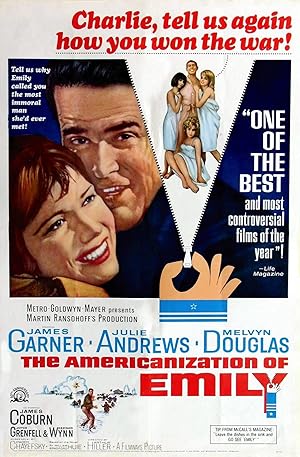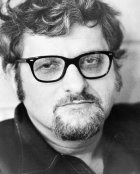
The Americanization of Emily Page #4
with Charlie...
Hello, Emily.
Hello. You're just in time for tea.
Thank you.
- You brought me some chocolates?
- Two boxes of Hershey's.
That's very American of you, Charlie.
You just had to bring along
some small token of opulence.
I don't want them.
You Yanks can't even show affection
without buying something.
Don't get into a state over it.
I thought you liked chocolates.
I do! But my country's at war...
and we're doing without chocolates
for a while.
I don't want oranges or eggs
or soap flakes, either.
Don't show me how profitable it'll be
to fall in love with you, Charlie.
Don't Americanize me.
That's my father.
He lost a leg in the first war.
Got the Victoria Cross for that.
He died in an air raid a week after
that portrait was painted.
That's my brother, there.
His name was Charlie, too, by the way.
He was shot down during the blitz.
Sacrificed himself to save his squadron.
The one you're looking at now
is my husband.
He looks like a rake.
Yes. He was very bawdy.
I was insane about him.
He died at Tobruk.
The rest of the lot there are cousins.
There's two of them still living.
I must say the family's been thinned out
nicely one way or another.
Charlie, before we go out to my mum,
I must tell you...
she's a bit mad.
You'll like her very much.
She's very funny.
But she may yatter away
about my father and my brother...
as though they were still alive.
Just go along with her.
Do you understand?
I understand.
You don't want my Hershey bars.
I think it profane to enjoy this war.
I never realized what a sensual
satisfaction grieving is for women.
I'm not sure that's a very tasteful thing
for you to say.
I'm not sentimental about war.
I see nothing noble in widows.
You're jealous of my husband. I like that.
Mother.
You've brought chocolates,
two whole boxfuls.
- What a treasure trove.
- I already refused them.
- On ascetic grounds.
- You're an absolute flatulent, Emily.
Take the things if you want them.
I shall have one later
and save the rest for your father.
You must be Emily's new lover
since she hasn't bothered to introduce us.
You must be her mother.
You found the chink in my armor.
What are your religious views?
- I'm a practicing coward.
- That's very fervent of you.
I should have known
you two would get on.
You're as dotty as she is, Charlie.
Before the war,
I was an assistant night manager...
of a diplomatic hotel in Washington, D.C.
What made you say that?
Lord, I feel like Alice at the tea party.
He's going to tell us
about a religious experience.
Yes. It was my job as assistant
night manager to arrange things...
for many of the great historical figures
on great historical missions.
What exactly did you arrange?
Usually I arranged girls,
but individual tastes varied, of course.
Of course.
It's useful work, anyway,
especially in a war.
I was offered all sorts of commissions
in the Army and the Navy.
The one I have now. Adm. Jessup
phoned me to join his staff...
but I'd always been a little embarrassed
by my job at the hotel...
and I wanted to do something redeeming.
War is the only chance a man has
to do something redeeming.
- That's why war is so attractive.
- War's very handsome, I agree.
At any rate, I turned down
Adm. Jessup's offer...
and I enlisted in the Marines as a private.
I even applied for combat service.
My wife, to all appearances
a perfectly sensible woman...
encouraged me in this idiotic decision.
Seven months later, I found myself
invading the Solomon Islands.
There I was splashing away
in the shoals of Guadalcanal.
It occurred to me a man could get killed
doing this kind of thing.
Fact is, most of the men
splashing along with me...
were screaming in agony
and dying like flies.
Those were brave men dying there.
Peacetime, they'd all been
normal, decent cowards...
frightened of their wives,
trembling before their bosses...
terrified of the passing of the years.
But war had made them gallant.
They had been greedy men.
Now they were self-sacrificing.
They had been selfish.
Now they were generous.
War isn't hell at all. Man at his best.
The highest morality he's capable of.
Never mind all that.
What's this about a wife?
That night,
I sat in the jungles of Guadalcanal...
waiting to be killed, sopping wet.
It was then I had my blinding revelation.
I discovered I was a coward.
That's my new religion.
I'm a big believer in it.
Cowardice will save the world.
It's not war that's insane, you see.
It's the morality of it. It's not greed
and ambition that makes wars.
It's goodness.
Wars are always fought
for the best of reasons...
for liberation or manifest destiny...
always against tyranny
and always in the interest of humanity.
So far this war
we've managed to butcher...
some 10,000,000 humans
in the interest of humanity.
Next war, it seems we'll have
to destroy all of man...
in order to preserve his damn dignity.
It's not war that's unnatural to us.
It's virtue.
As long as valor remains a virtue
we shall have soldiers.
So I preach cowardice.
Through cowardice, we shall all be saved.
That was exalting, Commander.
Absolutely occult.
Never mind the metaphysics, Commander.
Let's get back to your wife.
Needless to say, that first night,
I wrote Adm. Jessup, saying...
"For heaven's sakes, get me out of this. "
Two weeks later,
I was transferred back to Washington.
I raced home to my wife...
- And found her with another man.
- Lord, no.
My wife, who had deceived me
more times before the war...
than I care to think about...
was now having the time of her life
being faithful.
She was furious with me for coming back.
There was no reason
for her being virtuous anymore.
She promptly sued me for divorce...
on the grounds of religious differences.
I was a self-preservationist...
and she was a high
Anglican sentimentalist.
You're fair game, then.
After every war, you know we always
find out how unnecessary it was...
and after this I'm sure all the generals...
will write books about the blunders
made by other generals...
and statesmen will publish
their secret diaries...
and it'll show beyond
any shadow of doubt...
that war could easily have been avoided
in the first place.
The rest of us, of course, will be left...
with the job of bandaging the wounded
and burying the dead.
I don't trust people who make bitter
reflections about war, Mrs. Barham.
It's the generals
with the bloodiest records...
who are the first to shout what a hell it is.
It's always the war widows
who lead the Memorial Day parades.
That was unkind, Charlie, and very rude.
We shall never end wars, Mrs. Barham,
by blaming it on ministers and generals...
or warmongering imperialists
or all the other banal bogeys.
It's the rest of us who build statues
to those generals...
and name boulevards
after those ministers.
The rest of us who make heroes
of our dead...
Translation
Translate and read this script in other languages:
Select another language:
- - Select -
- 简体中文 (Chinese - Simplified)
- 繁體中文 (Chinese - Traditional)
- Español (Spanish)
- Esperanto (Esperanto)
- 日本語 (Japanese)
- Português (Portuguese)
- Deutsch (German)
- العربية (Arabic)
- Français (French)
- Русский (Russian)
- ಕನ್ನಡ (Kannada)
- 한국어 (Korean)
- עברית (Hebrew)
- Gaeilge (Irish)
- Українська (Ukrainian)
- اردو (Urdu)
- Magyar (Hungarian)
- मानक हिन्दी (Hindi)
- Indonesia (Indonesian)
- Italiano (Italian)
- தமிழ் (Tamil)
- Türkçe (Turkish)
- తెలుగు (Telugu)
- ภาษาไทย (Thai)
- Tiếng Việt (Vietnamese)
- Čeština (Czech)
- Polski (Polish)
- Bahasa Indonesia (Indonesian)
- Românește (Romanian)
- Nederlands (Dutch)
- Ελληνικά (Greek)
- Latinum (Latin)
- Svenska (Swedish)
- Dansk (Danish)
- Suomi (Finnish)
- فارسی (Persian)
- ייִדיש (Yiddish)
- հայերեն (Armenian)
- Norsk (Norwegian)
- English (English)
Citation
Use the citation below to add this screenplay to your bibliography:
Style:MLAChicagoAPA
"The Americanization of Emily" Scripts.com. STANDS4 LLC, 2025. Web. 23 Feb. 2025. <https://www.scripts.com/script/the_americanization_of_emily_2728>.







Discuss this script with the community:
Report Comment
We're doing our best to make sure our content is useful, accurate and safe.
If by any chance you spot an inappropriate comment while navigating through our website please use this form to let us know, and we'll take care of it shortly.
Attachment
You need to be logged in to favorite.
Log In